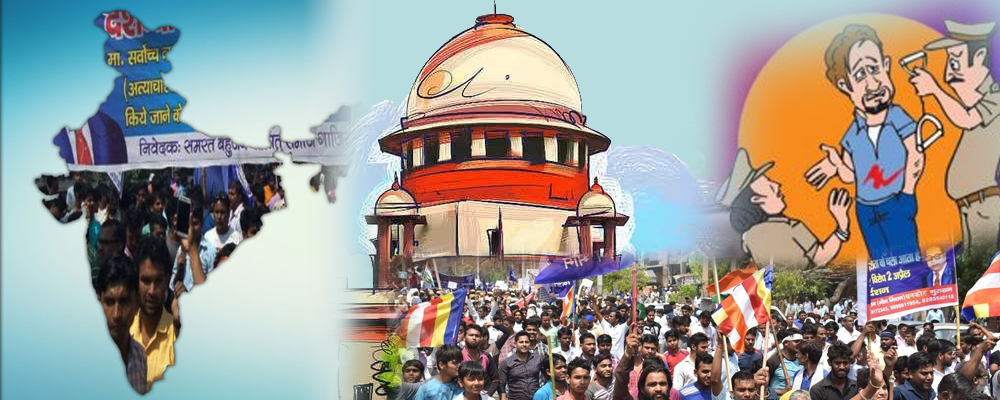As offences under the SC/ST Prevention of Atrocities Act 1989 are cognizable and non-bailable offences, you have to file a bail application before the Court of Session to get bail.
The government of India enacted the Prevention of Atrocities Act in 1989 which describes certain crimes against the Scheduled Caste (SC) and Schedule Tribe (ST) as atrocities. Thereon, delineates strategies as well as punishments for encountering such acts or crimes.
The Act aims at curbing as well as punishing the violence against SC and STs thereby emphasizing the upliftment of their community and abolishing the ill practice of untouchability.
section 3(1)(r)(s) of sc/st act bailable?
The offences under the Prevention of Atrocities Act are cognizable and non-bailable. This implies police have the power to arrest the offender without any warrant if any offence is committed against the SC/ST under this Act. Further, no bail can be granted to the offender if arrested under the Act.
Earlier, no preliminary inquiry was conducted before making arrests in atrocity cases. The Supreme Court altered the provision where the bench of judges directed that no arrests can be made without prior permission. Further, the provisions of anticipatory bail were also discarded. Following a judgment by the Supreme Court, the social justice and empowerment minister states that bail will only be allowed if there existed no prima facie case.
Need A Legal Advice
The internet is not a lawyer and neither are you. Talk to a real lawyer about your legal issue

What constitutes offence under the Prevention of Atrocities Act?
Before knowing about the provisions of bail under the Prevention of Atrocities Act, let me give you a fair idea about the acts that constitute offenses under the Act.
- Forceful eating or drinking inedible substances- An act where SC/STs are forced to eat or drink any inedible or poisonous substance by individuals of other communities shall constitute an act of atrocity and punishable under the SC/ST Act.
Dumping Excreta/Waste- When excreta or waste matter is dumped near the house of any SC/ST causing them annoyance, insulting or injuring them, such an act is an act of atrocity and is an punishable offence.
Parade in naked body- Parading any individual from SC/ST community with their faces and body painted also constitutes an offence.
Depriving of cultivation of land/Denial of rights over their land, water or other premises.
Forcing the SC/ST individuals to beg alms or work as bonded labourers also amounts to offence under the Act.
Denying voting rights according to the wishes of the SC/ST individuals will constitute an offence under the Act.
Denial of clean drinking water.
Insulting or defaming publicly.
False criminal allegations that lead to imprisonment of SC/ST individuals are considered an offence under the SC/ST Act.
Whether bail can be granted under the SC/ST Prevention of Atrocities Act?
section 3 of sc/st act bailable or non bailable:
As I have mentioned above offences under the Act are non-bailable, unless an application for bail is made to the Magistrate. You can file a bail application before the Sessions Court in case of any offense committed under provisions of the Atrocities Act. The offences are triable by the Court of Session. The accused has the right to approach the High if the bail application is rejected by the Sessions Court. According to the recent amendment the accused has to file a criminal appeal before the High court under section 14(A)2 of the Prevention of Atrocities Act for regular bail. You can consult advocates at Lead India who will draft and file bail applications and lets you know about sc/st act bail procedure under these circumstances.
Role of judiciary:
In Hitesh Verma v State of Uttarakhand, 2020, a 3 judge bench held that unless a specific malicious intention exists that humiliates a member of the SC-ST community the acts cannot be deemed to be an offence under the Atrocities Act. Thus it was held by the Court that no offence has been committed against the member as humiliation occurred within four walls and the test of public view is not satisfied for the offence to be upheld.
Recently in 2021, when the Cantonment police arrested two army jawans under sections of the Scheduled Castes and Scheduled Tribes (Prevention of Atrocities) Act, were released on bail in a couple of days.
Conclusion
Based on the above-mentioned facts, amendments and case law it can be concluded that bail can be granted to the accused after the arrest has been made or an application for anticipatory bail can be made before the arrest.
Nonetheless, the act is the backbone that aims to prevent not only violence against the marginalized communities but allow them to live a dignified life as good as any other upper-class citizen. As for implementation, it has been inadequate to date and the executive must ensure that the rules are properly implemented hereinafter.
To defy any such atrocities being committed against any individual you can reach out to the best advocates at Lead India who offer expert advice and guidance to deal with such cases. Hence, at Lead India you can Talk to a Lawyer for Free Legal Advice or Ask a Legal Question.





 Talk to a Lawyer
Talk to a Lawyer